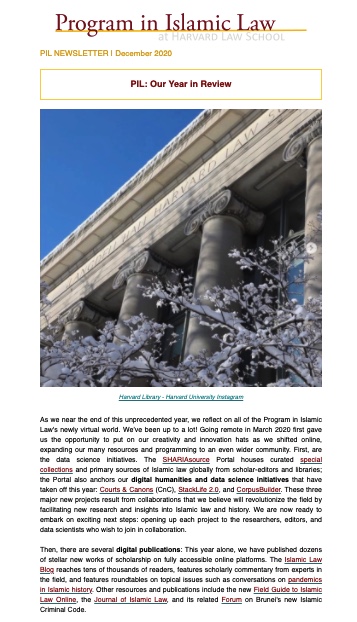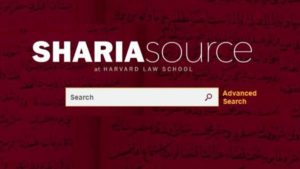
 PIL: Our Year in Review As we near the end of this unprecedented year, we reflect on all of the Program in Islamic Law’s newly virtual world. We’ve been up to a lot! Going remote in March 2020 first gave us the opportunity to put on our creativity and innovation hats as we shifted online, expanding our many resources and programming to an even wider community. First, are the data science initiatives. The SHARIAsource Portal houses curated special collections and primary sources of Islamic law globally from scholar-editors and libraries; the Portal also anchors our digital humanities and data science initiatives that have taken off this year: Courts & Canons (CnC), StackLife 2.0, and CorpusBuilder. These three major new projects result from collaborations that we believe will revolutionize the field by facilitating new research and insights into Islamic law and history. We are now ready to embark on exciting next steps: opening up each project to the researchers, editors, and data scientists who wish to join in collaboration.
PIL: Our Year in Review As we near the end of this unprecedented year, we reflect on all of the Program in Islamic Law’s newly virtual world. We’ve been up to a lot! Going remote in March 2020 first gave us the opportunity to put on our creativity and innovation hats as we shifted online, expanding our many resources and programming to an even wider community. First, are the data science initiatives. The SHARIAsource Portal houses curated special collections and primary sources of Islamic law globally from scholar-editors and libraries; the Portal also anchors our digital humanities and data science initiatives that have taken off this year: Courts & Canons (CnC), StackLife 2.0, and CorpusBuilder. These three major new projects result from collaborations that we believe will revolutionize the field by facilitating new research and insights into Islamic law and history. We are now ready to embark on exciting next steps: opening up each project to the researchers, editors, and data scientists who wish to join in collaboration.
Then, there are several digital publications: This year alone, we have published dozens of stellar new works of scholarship on fully accessible online platforms. The Islamic Law Blog reaches tens of thousands of readers, features scholarly commentary from experts in the field, and features roundtables on topical issues such as conversations on pandemics in Islamic history. Other resources and publications include the new Field Guide to Islamic Law Online, the Journal of Islamic Law, and its related Forum on Brunei’s new Islamic Criminal Code.
Alongside the online digital tools and publications is robust programming that brings it all to life in a community of students and scholars coming together from all over the world. This year, our Islamic Law Speakers Series has shifted to a Zoom webinar format; the recorded videos are also posted on the PIL website and Vimeo channel with closed captioning for accessibility. For our students, we offer regular teaching and advising, convene a Digital Islamic Law Lab to explore the intersection of Islamic law and data science, and offer myriad opportunities for student fellowships, research assistantships, and to serve on the Journal editorial board. In short, there is a lot there, more to come, and plenty of ways to get involved or participate online. All of this has been achieved with the continuing support and engagement of both the local and broader global community members, such as yourself. Thank you, our work is made possible by you.
 CONTENT: Online Companion to Mālik’s Muwaṭṭaʾ This time last year, we published the seminal English translation, Al-Muwaṭṭaʾ, the Royal Moroccan Edition: The Recension of Yaḥyā Ibn Yaḥyā al-Laythī by Mālik b. Anas as a part of the Harvard Series in Islamic Law by Harvard University Press, edited by Prof. Mohammad Fadel (University of Toronto, Faculty of Law) and Dr. Connell Monette (President, American College Casablanca). We are now happy to highlight the accompanying Online Companion to Mālik’s Muwaṭṭaʾ featured on the SHARIAsource portal. This special collection serves as a resource for introducing interested readers to the translation of this core work of Islamic law’s founding period by including an online introduction to the print translation of the Royal Moroccan Edition of the Muwaṭṭaʾ, excerpts of the the English translation itself, and supplemental materials that will provide further biographical and historical background to the people, events, and ideas that inform the legal texts, including maps and timelines, biographies of major figures, and a history of the text. Special thanks to student research assistant Daniel Jacobs (PhD candidate in History at Harvard) who supported the project.
CONTENT: Online Companion to Mālik’s Muwaṭṭaʾ This time last year, we published the seminal English translation, Al-Muwaṭṭaʾ, the Royal Moroccan Edition: The Recension of Yaḥyā Ibn Yaḥyā al-Laythī by Mālik b. Anas as a part of the Harvard Series in Islamic Law by Harvard University Press, edited by Prof. Mohammad Fadel (University of Toronto, Faculty of Law) and Dr. Connell Monette (President, American College Casablanca). We are now happy to highlight the accompanying Online Companion to Mālik’s Muwaṭṭaʾ featured on the SHARIAsource portal. This special collection serves as a resource for introducing interested readers to the translation of this core work of Islamic law’s founding period by including an online introduction to the print translation of the Royal Moroccan Edition of the Muwaṭṭaʾ, excerpts of the the English translation itself, and supplemental materials that will provide further biographical and historical background to the people, events, and ideas that inform the legal texts, including maps and timelines, biographies of major figures, and a history of the text. Special thanks to student research assistant Daniel Jacobs (PhD candidate in History at Harvard) who supported the project.
 CONTEXT: PIL Podcasts and Streaming Events This year, we released a series of original podcasts hosted by Prof. Dana Lee (former Program in Islamic Law Research Fellow and current Assistant Professor of Law and Mohannad and Rana Malas Scholar in Islamic Legal Studies at University of California at Irvine Law) and Ari Schriber (PhD Candidate in Near Eastern Languages and Civilizations at Harvard). The stellar line-up of guests feature scholars of Islamic law informally discussing their open thoughts on the field: Prof. Khaled Abou El Fadl (UCLA Law) on reclaiming shariah in the modern age, Prof. Mohammed Fadel (Toronto Law) on the al-Muwatta’ of Malik b. Anas as well as Dr. Connell Monette (American College Casablanca) on the new al-Muwatta’ English translation, Prof. Omar Farahat (McGill Law) on the foundation of norms in Islamic jurisprudence and theology, Prof. Mohsen Kadivar (Duke) on toleration in Islam, Prof. Ahmed El Shamsy (Chicago) on the study of Islamic law, Prof. Maya Shatzmiller (NYU) on the economics behind women’s property rights in Islamic law, and Prof. Sylvia Vatuk (University of Illinois, Chicago) on women, marriage, and Islamic law in India. All podcasts are featured on the PIL website and Soundcloud channel.
CONTEXT: PIL Podcasts and Streaming Events This year, we released a series of original podcasts hosted by Prof. Dana Lee (former Program in Islamic Law Research Fellow and current Assistant Professor of Law and Mohannad and Rana Malas Scholar in Islamic Legal Studies at University of California at Irvine Law) and Ari Schriber (PhD Candidate in Near Eastern Languages and Civilizations at Harvard). The stellar line-up of guests feature scholars of Islamic law informally discussing their open thoughts on the field: Prof. Khaled Abou El Fadl (UCLA Law) on reclaiming shariah in the modern age, Prof. Mohammed Fadel (Toronto Law) on the al-Muwatta’ of Malik b. Anas as well as Dr. Connell Monette (American College Casablanca) on the new al-Muwatta’ English translation, Prof. Omar Farahat (McGill Law) on the foundation of norms in Islamic jurisprudence and theology, Prof. Mohsen Kadivar (Duke) on toleration in Islam, Prof. Ahmed El Shamsy (Chicago) on the study of Islamic law, Prof. Maya Shatzmiller (NYU) on the economics behind women’s property rights in Islamic law, and Prof. Sylvia Vatuk (University of Illinois, Chicago) on women, marriage, and Islamic law in India. All podcasts are featured on the PIL website and Soundcloud channel.
See the full newsletter.

